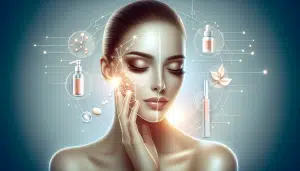Unlock Glowing Skin and Hair with Simple Collagen Routines
Charlotte Stone August 24, 2025
Curious about what boosts radiant skin and luscious hair? This guide unveils how collagen routines, balanced nutrition, and mindful daily habits support natural beauty from within. Dive in to learn about science-backed strategies for real, sustainable wellness and beauty results.
The Science Behind Collagen and Natural Beauty
Collagen, the major structural protein in skin, hair, and nails, plays a vital role in maintaining beauty and health. With age, its production slows, resulting in visible signs like fine lines and sagging. For many, supporting collagen from the inside out is a cornerstone for glowing skin and strong hair. Modern research highlights that diet, lifestyle, and topical ingredients all influence collagen metabolism. Understanding these connections can help refine a personal self-care routine aimed at lasting wellness.
Collagen supplements and peptides have gained popularity for their perceived role in skin elasticity and firmness. Randomized clinical studies have observed measurable improvements among adults using hydrolyzed collagen peptides for several months, reflecting decreased skin roughness and a more youthful appearance (Source: https://www.ncbi.nlm.nih.gov/pmc/articles/PMC6835901/). These findings encourage a deeper exploration of nutritional and holistic factors in beauty routines. Other nutrients, like vitamin C and zinc, also support collagen synthesis, making balanced intake crucial.
External stressors—UV rays, pollution, and lifestyle habits—accelerate collagen loss. Preventive care can slow this process. Using daily SPF, consuming antioxidant-rich foods, and practicing regular hydration all safeguard the body’s natural collagen reserves. Combined with mindful self-care, these strategies support sustainable beauty goals without quick fixes or overpromising results.
Daily Habits That Help Collagen Production
Certain daily habits naturally encourage the body’s collagen production. Staying hydrated, consuming fruits such as citrus and berries, and including nuts or seeds in your diet provide building blocks for new protein synthesis (Source: https://www.hsph.harvard.edu/nutritionsource/vitamin-c/). Minimizing processed sugars and smoking is equally important, as excess sugar and oxidative damage can degrade existing collagen and limit new growth.
Regular physical activity supports circulation and cell turnover, which are linked to increased collagen production. Studies suggest moderate-intensity exercise encourages the flow of nutrients essential for tissue repair. Even gentle yoga or stretching sessions have been shown to support healthy skin structure. Establishing a movement routine can bring visible improvements to both beauty and overall wellness.
Quality sleep also has a profound influence. During sleep, the body repairs and rebuilds tissues, including skin and hair. Developing bedtime routines—such as reducing blue light before sleeping and sticking to consistent hours—allows the body’s restorative cycles to operate efficiently, fostering healthier skin and a more glowing appearance over time.
Nutrition Strategies for Hair and Skin Health
Protein-rich foods like lean meats, legumes, and eggs are directly tied to collagen synthesis and the integrity of skin and hair. These sources provide amino acids—glycine, proline, and hydroxyproline—that fuel collagen production. Research from the Linus Pauling Institute shows that a diet lacking these nutrients can manifest in dryness, fragility, and poor tissue repair (Source: https://lpi.oregonstate.edu/mic/dietary-factors/vitamins/vitamin-c).
Antioxidant-rich produce, such as leafy greens and colorful vegetables, helps fight free radicals that harm collagen fibers. Beta-carotene (from carrots and sweet potatoes) and lycopene (from tomatoes) provide antioxidant protection, while minerals like copper and selenium act as cofactors in collagen synthesis. Including these nutritionally dense foods regularly supports vibrant hair and resilient skin (Source: https://ods.od.nih.gov/factsheets/Selenium-Consumer/).
Omega-3 fatty acids—found in fatty fish, flaxseed, and walnuts—are linked with improved skin barrier function and less inflammation. Incorporating these foods may help manage dryness and protect collagen structure, supporting a naturally healthy glow. Balanced nutrition, rather than restrictive diets, often yields the most noticeable beauty benefits over time.
Mindful Beauty: The Role of Stress and Rest
Stress management is a key factor in skin and hair wellness. Chronic tension elevates cortisol, a hormone that, in excess, can weaken collagen and delay tissue repair. Practices like meditation, controlled breathing, and mindful walks are proven to ease stress and support healthier cellular function—revealing the close link between emotional balance and visible beauty (Source: https://www.apa.org/monitor/2019/05/ce-corner-stress-skin).
Rest, not just sleep, includes moments of daily pause—time without screens, intentional self-care, and unplugging from stressors. These breaks support hormonal balance, immune function, and the ability to maintain optimal skin and hair growth cycles. Many find that integrating brief mindfulness exercises or journaling improves their sense of well-being, which often shows in brighter skin and stronger hair.
Social connection also influences wellness by supporting mental health, which is linked to glowing, resilient beauty. Being part of a supportive community or engaging in creative outlets releases feel-good endorphins, enhancing inner and outer radiance. Mindful relationships and regular self-kindness may quietly be some of the most transformative beauty tools available.
Emerging Trends: Collagen Boosters and Beauty Tech
Recent years have seen a surge in interest around “beauty tech”—devices and products said to stimulate collagen or smooth appearance. Tools like microcurrent facial rollers, LED masks, and ultrasonic skin scrubbers are now widely discussed. Some clinical research demonstrates minor improvements in skin texture with consistent use, but experts urge realistic expectations and prioritizing safety (Source: https://www.aad.org/public/everyday-care/skin-care-basics/care/skin-care-technology).
Topical products containing retinoids, peptides, and vitamin C derivatives are thought to promote collagen renewal. The American Academy of Dermatology notes that, when used responsibly, these can support a smoother and brighter complexion. Patch testing and gradual introduction remain essential steps, especially for sensitive skin or those prone to irritation.
Holistic practitioners are also highlighting adaptogen herbs, gentle facial massage, and new plant-based skincare as supportive elements for robust beauty routines. Scientific understanding continues to evolve, but the general consensus emphasizes consistency and evidence-based choices over chasing quick fixes. Combining tried-and-true basics with thoughtful innovation often yields steady, natural-looking results.
Your Personal Beauty Routine: From Ideas to Everyday Practice
Setting up a practical, nourishing routine begins with self-observation. Identifying one or two habits—hydration or weekly cooking with leafy vegetables, for example—and steadily building on them can show tangible improvements (Source: https://www.cdc.gov/healthyweight/healthy_eating/fruits_vegetables.html). Regular self-kindness and patience make sustainable change easier and more enjoyable.
Tracking progress, even through a photo journal or notes app, helps reinforce new routines. This approach can provide honest reflections and encourage continuing small, realistic steps. Consulting with dermatologists or nutritionists, when needed, adds tailored strategies while demystifying the path to healthy skin and hair.
Ultimately, embracing beauty as a state of well-being instead of perfection encourages self-confidence and resilience. Approaching wellness with curiosity and openness allows routines to evolve, supporting both outer radiance and a grounded sense of self-worth. Sustainability and self-education take priority, making ongoing beauty care enjoyable and rewarding.
References
1. Zague, V., de Freitas, V., da Costa Rosa, M. et al. (2018). Collagen peptides supplementation: An update on efficacy and mechanisms of action. Retrieved from https://www.ncbi.nlm.nih.gov/pmc/articles/PMC6835901/
2. Harvard T.H. Chan School of Public Health. (2023). Vitamin C. Retrieved from https://www.hsph.harvard.edu/nutritionsource/vitamin-c/
3. Linus Pauling Institute. (2022). Vitamin C. Retrieved from https://lpi.oregonstate.edu/mic/dietary-factors/vitamins/vitamin-c
4. National Institutes of Health. (2023). Selenium – Fact Sheet for Consumers. Retrieved from https://ods.od.nih.gov/factsheets/Selenium-Consumer/
5. American Psychological Association. (2019). CE Corner: How stress affects the skin. Retrieved from https://www.apa.org/monitor/2019/05/ce-corner-stress-skin
6. American Academy of Dermatology Association. (2022). Skin care technology: Do popular devices and tech really work? Retrieved from https://www.aad.org/public/everyday-care/skin-care-basics/care/skin-care-technology







